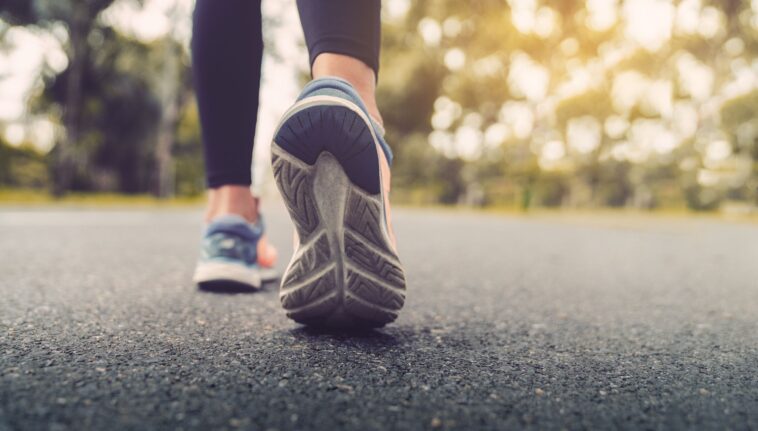Walking is both one of the simplest and most beneficial forms of exercise. This form of exercise provides numerous health benefits for both the body and the mind. In addition to being beneficial to our overall health, this is a simple activity. It can be performed anywhere and at any time and requires neither special talents nor equipment.
Regarding leisure, is there a perfect time to go for a walk during the day? There is no straightforward answer. Each person’s availability, health, needs, and preferences may determine the best time for walking. Some prefer to exercise first thing in the morning, while others prefer to exercise after work. There are also individuals who are able to squeeze in a midday session.
This article will discuss the The Best Time for Walking of the day.
The Best Time for Walking
Walking in the Morning
If you’re the type of person that usually gets up pretty early, you can easily fit a morning workout into your schedule. Here’s why you should do it:
- A 45-minute vigorous walk in the morning can help you reduce your appetite throughout the day, preventing you from gaining unwanted weight.
- Working out at 7:00 a.m. can help improve your circadian rhythm. You’ll be more energised in the morning and fall slumber earlier at night, ensuring that you get sufficient rest each night.
- According to this American Psychological Association article, morning exercise promotes the formation and maintenance of healthy behaviours.
- A walk in the morning can help you reduce tension, clear your mind of negative thoughts, and increase your productivity throughout the day.
- Compared to other periods of the day, air pollution levels are lower in the early morning.
As you can see, there are plenty of benefits of walking in the morning. Of course, there are cons as well. Let’s take a look:
- If you are not a morning person, rising up early presents the greatest disadvantage. This may appear to be a simple obstacle to surmount, but for some it is not. Additionally, getting up early to exercise may influence your sleep pattern.
- You won’t be able to expend as many calories earlier in the day as you will later on.
- Your morning body temperature is lower, so you will feel less energised than at other times of the day.
- First thing in the morning, your body may feel quite stiff. It is necessary to limber up and stretch because your muscles are colder and stiffer. This will prevent injuries by adequately preparing your body for a vigorous walk or jog.
Walking in the Evening
If you’re not an early riser or you’re pretty busy during the first part of the day, an evening exercise may suit you just fine. Here are the benefits of walking in the evening:
- According to research, evening exercise can be an effective method for controlling blood sugar.
- A study demonstrates that a post-dinner stroll can improve digestion.
- After a long day, an evening stroll is an excellent way to let go of your concerns and unwind. You are able to clear your mind and spend quality time with your family during a 30-minute walk.
- Contrary to conventional belief, late-day exercise does not interfere with sleep. Walking later in the day will help you relieve stress and sleep better at night. Just ensure that you don’t go to bed immediately after your exercise so that your body can relax.
- Your muscles are significantly warmer and more flexible, reducing the risk of injury.
Exercising in the evening does come with a multitude of benefits. Naturally, there are disadvantages as well:
- Safety worries. It is less secure to walk alone in the dark than it is early in the morning.
- During this time of day, the air pollution is typically at its worst. Therefore, imbibing various toxic pollutants during exercise may be detrimental to your health, particularly your cardiovascular system.
- Factor of fatigue. After a long day of labour, taking a stroll may not be your top priority. Sometimes it can be difficult to find the motivation to walk for 30 minutes in the evening.
How About an Afternoon Walk?
Going for a walk in the afternoon can also be an option. But this is not within everyone’s reach. Here’s why:
- A midday walk depends on each individual’s professional activity, luncheon, or work breaks. It is impossible for some individuals to sneak in a walking excursion.
- Clothing may also be an issue, particularly if you operate in an industry that requires a particular dress code. To go on a vigorous walk, you must wear comfortable clothing and shoes.
- In the afternoon during the summer, extreme heat is possible. It is advisable to avoid exercising during the day’s warmest hours.
Of course, if your schedule allows it, a walking session in the middle of the day can be rewarding:
- In the late afternoon, our bodies expend the most calories, according to a small study. Scientists have discovered that we expend 10% more calories during the afternoon compared to the morning and evening. It is essential to note, however, that researchers analysed bodies at repose and not during exercise.
- Recent research indicates that exercising in the afternoon is more beneficial for patients who are at high risk for or have been diagnosed with type 2 diabetes. The metabolic health of participants who trained in the afternoon improved significantly more than those who trained in the morning.
Also read: The Best Time To Walk
Always Track your Progress
Whether you choose to walk in the morning, afternoon, or evening, it is a good idea to keep note of your physical activity. Instead of overestimating or underestimating your performance, you will have a clear picture of how much you are actually moving. In addition, monitoring your activity will allow you to set a specific fitness objective, monitor your progress, and find the motivation to reach and even surpass your goal.
You do not need to purchase a separate fitness tracker in order to keep track of your steps. The only thing you need is your phone. Simply obtain a pedometer application, such as our own ActivityTracker, and you’re all set. The application will automatically track your physical activity throughout the day and display all relevant fitness metrics, including the number of steps taken, calories consumed, distance walked, and total time spent active. You will be able to set your own objectives and be constantly informed of your activity, even on an hourly basis.
The Bottom Line
Which is the optimal period to exercise? Well, the one that fits your schedule, requirements, and lifestyle the best. If waking up early comes naturally to you, don’t hesitate to take a brisk 30-minute walk. Alternatively, if you are a night enthusiast, you should go for a walk later in the evening. Those who have the leisure may also choose to go for a stroll in the afternoon.
Regardless of the time of day, the most essential thing is to incorporate 30 minutes of exercise into your daily schedule. Developing and maintaining such a healthy routine can only result in improved health and quality of life.





